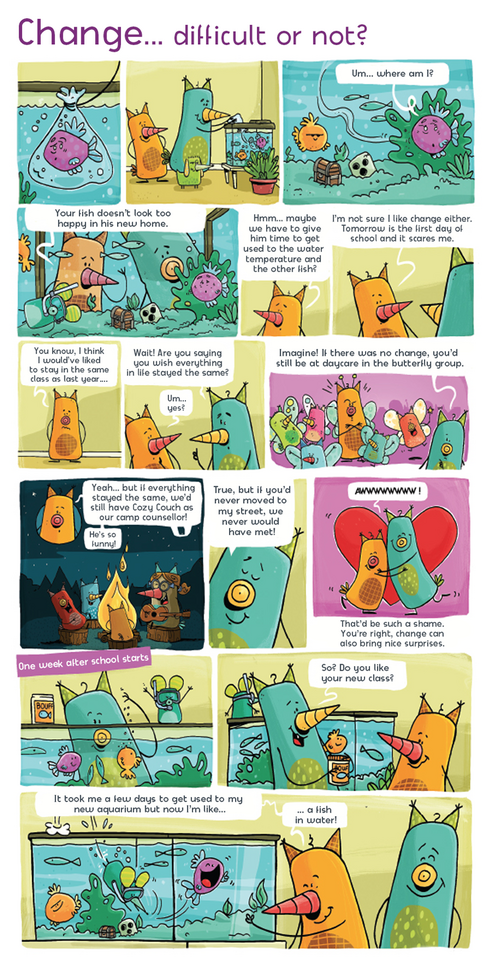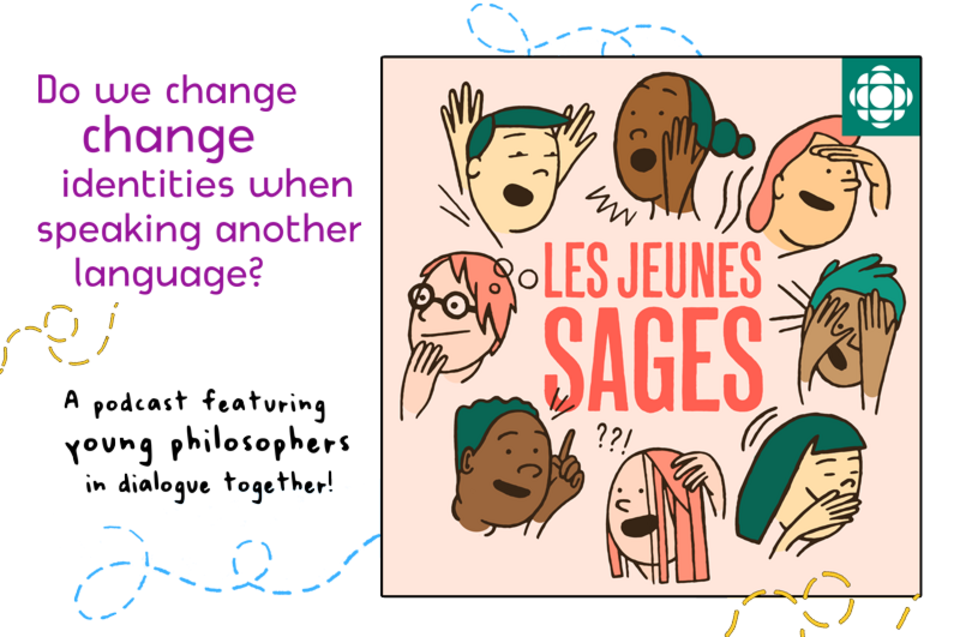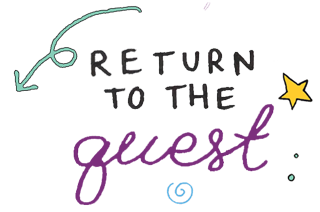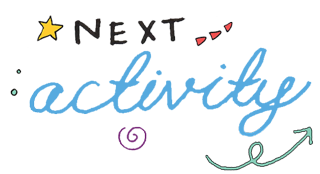
A change for the better?
| Objective: To feed your philosophical reflections on change with your family's help during lunch! |
Duration: 30 to 75 minutes
Material:
- Sheets of paper and pen
- Coloured pencils and markers
- Your family
Instructions:
It's time to eat! Gather your family around the table for an appetizing dialogue about change. Explore the following questions, finding inspiration in the thinking prompts as necessary. Together, think of reasons to explain your positions and try to build an answer by combining your ideas! But don't worry if the urge to keep talking doesn't subside... philosophical picnics are an insatiable quest!
...
- Question 1: Does everything change?
- Thinking prompts: The French writer Jean-Baptiste Alphonse Karr famously wrote, “the more things change, the more they stay the same.” But how can that be? Aren’t change and sameness in conflict? With your family, try to figure out whether you think that everything changes or not. Since change is such a big concept, it may be helpful to work in categories: living things, objects, ideas, etc. What brings about change in each of these categories? Alternatively, what causes them to stay the same? Wonder together if you think change is important. Are there several types of change or different reasons to change? When we talk about changing our socks, is it the same as talking about changing our minds? Have a look at the definition you came up with in your first Idea Stretching mission, and see how it compares to what you are discussing with your family. Does the concept’s meaning change (oh my!) depending on the context? Why or why not?
Question 2: Is change hard?
- Thinking prompts: As humans, we seem to be faced with changes constantly—even when it’s not what we want! Whether it’s as simple as changing out of pyjamas on a cold day or as major as changing schools, the experience of changing can be tough. But why? To inspire your thinking, you can read the comic below. Together, brainstorm why you think people might resist or fear change. Are they uncomfortable or insecure perhaps? How might they react negatively to change? Then, consider the opposite viewpoint: Can change be easy, even peaceful? Share some examples from your own lives when change felt hard and when it felt easy, and try to determine some criteria to understand the different experiences. What changes are necessary to a good life… and might there be changes that no one should ever have to experience? How might humans deal with change better?
- Question 3: Can anyone change the world?
- Thinking prompts: Have you ever heard the word “changemaker?” It’s a term used to describe people who want to make the world better so they actively create change for the greater good. But can anybody really have that power? Can one person make a difference? As a family, exchange ideas about what it might mean to be a changemaker… and if you have what it takes. Should everyone do their part to improve the world? Hmm… maybe it depends on how each person defines improvement! Perhaps if everyone tried to change things, it would cause more mess than progress. Could there be a dark side to wanting to change the world? Together, think of some of the good and bad consequences. Finally, try to finish the sentence: If change didn't exist, then _________.
...
Bonus: At its simplest, change can just mean not staying the same. But we also use another word for that: inconsistency, or the state of being changeable, variable, even unpredictable! Being inconsistent is a common—and often hilarious!—theme in Lewis Carroll’s classic story Alice’s Adventures in Wonderland: Alice faces so much constant change that the inconsistencies feel like nonsense, causing her to utter: “If I had a world of my own, everything would be nonsense. Nothing would be what it is, because everything would be what it isn't. And contrary wise, what is, it wouldn't be. And what it wouldn't be, it would. You see?” Confusing, much? Have a little fun with nonsense by being as inconsistent as you can for one whole hour! And see if some family members want to join in the madness. For example, you can say something while doing the exact opposite (exclaiming “I hate eating broccoli!” while munching on it with glee). You can defend contradictory opinions (“I believe in freedom of speech… and I refuse to hear what you have to say about it!”). You can say “yes” every time you mean “no” (except sometimes when you say “yes” to mean “yes”… wait, what?). Once you’ve enjoyed being changeable, think about your experience: Did inconsistency make it hard to know what you really meant… or what the other meant? Is it usually better to be consistent? Can you change without being inconsistent? Why or why not? |

This comic strip is reproduced with permission from the philosophy columns of our community partner, Les Explorateurs magazine. It was produced in collaboration with our team at the Institute of Philosophy, Citizenship and Youth.

| Tricks for tots: Even though change is everywhere all the time, we can still have trouble recognizing it… and dealing with it! Test out your own ability to see and manage change with this silly challenge: Stand up and cross your arms, as if you were bored and waiting around. In this case, crossing your arms just means folding them across your chest. Hang around like that for a few moments then, without thinking, fold your arms the other way around. Simple, right? Or is it...? Was it easy to reverse your arm position or did you have to stop and think about the change? How did it feel to have to cross your arms differently? Is making changes hard, no matter how small? Why or why not? |
| Tips for teens: Parlez-vous français ? As you prepare your meal or digest your feast of delicacies and tasty ideas, listen to the Les jeunes sages podcast on language. Drawing inspiration from the young philosophers, try to answer the following questions: Do we change identities when speaking another language? Put another way, are we the same person when we speak a different language? Why or why not? What might be the relation between language and change? Would it be easier to live in a world with only one language? If you can’t understand French, don’t worry! You can still wonder about the questions! You can even imagine that you are recording a podcast with your family… Family Wisdom! |
Share your creative reflections by sending them via email.
Include photos of your projects and notes of your thoughts, as well as your first name and your age!


